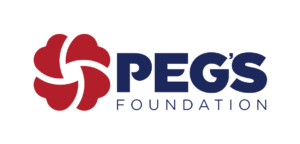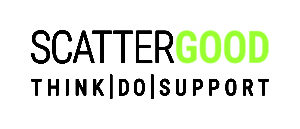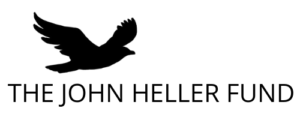This guide was written for individual donors, foundation professionals, and others interested in using charitable and philanthropic funds to address mental health disorders and addiction in the United States. Whether you have a hundred dollars or a billion dollars to give, our hope is that the information contained in this guide helps you understand the key opportunities to drive impact and the ways you can help. As always, our team’s goal is to equip you with the knowledge to translate good intentions into positive change.
Health in Mind was generously supported by the following organizations:

Peg’s Foundation, founded in 2001 by Burt and Peg Morgan, is committed to creating opportunities for sharing knowledge, promoting partnerships, and inspiring improvements in the behavioral health system.

The Thomas Scattergood Behavioral Health Foundation believes major disruption is needed to build a stronger, more effective, compassionate, and inclusive health care system—one that improves well-being and quality of life as much as it treats illness and disease.

The AmerisourceBergen Foundation is an independent not-for-profit charitable giving organization established by the AmerisourceBergen Corporation to support health-related causes that enrich the global community.

The John Heller Fund is a memorial fund at the Scattergood Foundation for the pursuit of high impact opportunities in mental health and addiction.

The Kennedy Forum leads a national dialogue on transforming the health care system by uniting mental health advocates, business leaders, and government agencies around a common set of principles. The Forum aims to achieve health equity by advancing evidence-based practices, policies, and programming for the treatment of mental health and addiction.
This work builds off of CHIP’s 2016 guide: Lifting the Burden of Addiction, which was generously supported by the Mistral Foundation.
Authors
- Kristen Ward, Social Impact Fellow
- Hanh La, Director, Applied Research and Analysis
- Michelle Evans-Chase, Senior Research Analyst
- Emily Seeburger, Applied Research Analyst
- Katherina M. Rosqueta, Founding Executive Director
Advisory Board
- Olivia Dell – Venture Fellow, Falkon Ventures
- Richard G. Frank, PhD – Margaret T. Morris Professor of Health Economics, Department of Health Care Policy, Harvard Medical School
- Mary Giliberti, JD – Executive Vice President of Policy, Mental Health America
- Rick Kellar, MBA – President, Peg’s Foundation
- Amy Keller Laird – Executive Vice President, Brand & Audience Development, Remedy Health Media
- Patrick J. Kennedy – Former Congressman (D-RI) and Founder, The Kennedy Forum
- Marsden McGuire, MD, MBA – Director, Continuum of Care and General Mental Health Services, Office of Mental Health and Suicide Prevention, Department of Veterans Affairs
- Kathleen M. Pike, PhD – Chair, Global Mental Health Programs at Columbia University and Professor of Psychology in Psychiatry, Epidemiology and Health Policy at Columbia University Irving Medical Center
- Joe Pyle, MA – President, the Thomas Scattergood Behavioral Health Foundation
- Cheryl Roberts, JD – Executive Director, the Greenburger Center for Social and Criminal Justice
- Linda Rosenberg, MSW – Director of External Relations, Columbia University Department of Psychiatry
- Laura Samberg, MA – Executive Director, Samberg Family Foundation
- Lloyd I. Sederer, MD – Adjunct Professor, Columbia University, Mailman School of Public Health, and Director, Columbia Psychiatry Media
- Shari Staglin, MPA – Co-Founder, One Mind
- Glenda Wrenn, MD, MSHP – Chief Medical Officer, 180 Health Partners, and Associate Professor of Psychiatry and Behavioral Science, Morehouse School of Medicine
Project Methodology
As with all of our work, we iteratively rely on academic research, informed opinion, and field experience to understand philanthropic opportunities that are both evidence-based and actionable. To discern the most promising philanthropic opportunities, we took a multipronged approach including the following key activities:
- Initial scan to identify any existing frameworks that could be used to organize a donor toolkit, through which we identified several resources that were helpful, but no single organizing framework appropriate for donor decision-making.
- Established a project Advisory Board made up of 15 experts working to advance mental health and addiction or an adjacent issue area (e.g. education and criminal justice), including funders, practitioners, academics, and policy experts.
- Reviewed and analyzed more than 150 academic articles, scientific papers, and reports on mental health and substance use, as well as adjacent issue areas (e.g. education, criminal justice system, and housing).
- Sought the perspectives of over 80 representative stakeholders via semi-structured interviews.
- Engaged in an iterative review process including Advisory Board members and other experts to ensure alignment with the broader behavioral health sector and philanthropic ecosystem.
- Sought the perspectives of over 30 individuals with lived experience to ensure that our recommendations were informed and supported by those who would most directly benefit from more effective philanthropic funding.
Acknowledgements
We would like to thank the many individuals who shared their expertise, offered insights, connected us to others, or provided feedback throughout this project:
- Daniel Alberttis, Quantum Foundation
- John Amoroso, The David and Lura Lovell Foundation
- C’jon Armstead, Quantum Foundation
- Jeremy Attermann, National Council for Behavioral Health
- Sophia Austin, Wellcome Trust
- Anne Bakar, Telecare Corporation
- Margaret Barry, National University of Ireland Galway
- Jose Benitez, and the staff at Prevention Point Philadelphia
- Lacey Berumen, Behavioral Science Director of TRACKtech
- David Bloom, Merrill Lynch
- Anna Bobb, Philanthropy Roundtable
- Jeffrey Borenstein, Brain and Behavior Research Foundation
- Rebecca Boursiquot, Shatterproof
- Terry Bridges, NAMI Tennessee
- Michael Brody, Mental Health Partnerships
- Lynnae Brown and students at Howie the Harp
- Steven Brunette, Boehringer Ingelheim
- Eve Byrd, The Carter Center
- Jonathan Calvis, Kinschner Family Foundation
- Thom Craig, Peg’s Foundation
- Deb D’Arcangelo, Council for Relationships
- Lisa Dixon, Columbia University
- Doug Grove, Kinschner Family Foundation
- Andrea Ducas, Robert Wood Johnson Foundation
- Kenn Dudek and the members of Fountain House
- Katherine Duncan, JED Foundation
- Alyson Ferguson, Thomas Scattergood Behavioral Health Foundation
- Vanessa Fernandes, National Alliance on Mental Illness
- Kim Firth, New Hampshire Endowment for Health
- Lauren Flynn, Mental Health Partnerships
- David Glahn, Boston Children’s Hospital
- Sherry Glied, New York University
- Yvonne Goldsberry, New Hampshire Endowment for Health
- Kelly Grajeda, Meadows Health Policy Institute
- Krithika Harish, Civitas Public Affairs
- Chuck Harman, National Alliance on Mental Illness
- Rikki Harris, Tennessee Voices for Children
- Irfan Hasan, New York Community Trust
- Jim Hayes, National Alliance on Mental Illness
- Bill Hilburn, Fountain House
- Amy Hutchinson, National Alliance on Mental Illness
- Chuck Ingoglia, National Council for Behavioral Health
- Monique Jenkins, Tennessee Voices for Children
- Valerie Johnson, and the staff at Pathways to Housing PA
- Cynthia Joyce, MQ Foundation
- Kenneth Jue, International Initiative for Mental Health Leadership
- Vicky Kelberer, Vanguard Charitable
- Andy Keller, Meadows Health Policy Institute
- Danielle Kemmer, International Alliance of Mental Health Research Funders
- Adrienne Kennedy, National Alliance on Mental Illness
- Angela Kimball, National Alliance on Mental Illness
- Matt Kudish, NAMI NYC
- Kara Kukfa, The Kennedy Forum
- Kathy Langlois, International Initiative for Mental Health Leadership
- Carlos Larrauri, National Alliance on Mental Illness
- Elizabeth Lion, Fountain House
- Tommy Lobben, Johnson & Johnson
- John MacPhee, JED Foundation
- David Mandell, University of Pennsylvania
- Aletha Maybank, Center for Health Equity, NYC Department of Health and Mental Hygiene
- Amber MacLaughlin, The Kennedy Forum
- Gary Mendell, Shatterproof
- Barbara Miller, NAMI Washington
- Ben Miller, Well Being Trust
- Jane Mogavero, Patrick P. Lee Foundation
- Gina Nikkel, Foundation for Excellence in Mental Health Care
- Tyler Norris, Well Being Trust
- Lauryn Nwankpa, Headspace, Inc.
- Maria Oquendo, University of Pennsylvania
- Patricia Owens, JP Morgan
- Joe Parks, The National Council for Behavioral Health
- Mary Beth Powers, Dalio Foundation
- Annelle Primm, The Steve Fund
- Ada Williams Prince, Pivotal Ventures
- Carrie Roach, National Alliance on Mental Illness
- Teresa Araco Rodgers, Harp Weaver
- Tym Rourke, New Hampshire Charitable Foundation
- David Rubin, Children’s Hospital of Philadelphia
- Mark Salzer, Temple University
- Shekhar Saxena, Harvard University
- Lori Schectman, Board Member of NAMI Southeastern AZ
- Randy Scheid, Quantum Foundation
- Karen Scott, Foundation for Opioid Response Efforts (FORE)
- Victor Schwartz, JED Foundation
- Frances Sheehan, the Foundation for Delaware County
- Karol Silva, Children’s Hospital of Philadelphia
- Bill Smith, Civitas Public Affairs
- John Snook, Treatment Advocacy Center
- Erica Snow, Colorado Health Foundation
- Laurence Steinberg, Temple University
- Rebecca Stewart, University of Pennsylvania
- Magda Guillen Swanson, Vanguard Charitable
- Katherine Switz, The Stability Network
- Adriana Torres-O’Connor, Mental Health Partnerships
- Mohini Venkatesh, National Council for Behavioral Health
- Megan Wanczyk, Foundation for Appalachian Ohio
- Jill Warner, Jawonio New York
- Sarah Weissberg, Fidelity Charitable
- Nicki Weston, Vulcan, Inc.
- Lesley White, Alkermes
- Michael Wolfe, Johnson & Johnson
Special thanks to the following colleagues at the Center for High Impact Philanthropy for their assistance and support: Kelly Andrews, Director, Knowledge Management and Marketing, Becca Bean, Research Assistant, Ariel Censor, Research Assistant, Margaret Fleming, Research Assistant, Patricia Jia, Communications and Marketing Associate, Libby Mathewson, Graduate Research Assistant, Carol McLaughlin, Senior Advisor, Global Public Health, Isabel Straw, Graduate Research Assistant, Tamla Tinsley, Program Coordinator.
